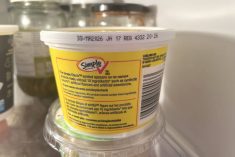U. S. herd liquidation begins:
Struggling U. S. hog producers appear to be heeding pressure from lenders and have accelerated selling their sows to reduce herds and hopefully drive up hog and pork prices in 2010, livestock sources said Aug. 20.
While the latest government data, which is two weeks old, shows sow liquidation still trailing the year-ago pace by a large margin, the sources said liquidation has increased in recent weeks. Sales have increased so much that the few pork plants that process them into bratwurst and sausage have been unable to buy them all.
Read Also

Students push for Manitoba road upgrades
Manitoba’s lack of higher-rated RTAC roads creates irritating highway detours and weight restrictions for farmers, University of Manitoba students told KAP.
Sunflower seed assets sold:
Monsanto Company has entered into an agreement to sell its global sunflower assets to Syngenta. Under the terms of the agreement, Syngenta will purchase assets and assume liabilities of Monsanto associated with its global hybrid sunflower seed business for $160 million. The transaction will be completed pending appropriate regulatory approvals. Carl Casale, Monsanto’s executive vice-president of strategy and operations said the company remains focused on its seeds and traits platform’s core crops.
Award-winning attitude:
Two Manitobans were among six young recipients of the Grant Moffat Memorial Award at the recent Canadian Charolais Youth Association convention in Peterborough, Ont. Marshall McDonald of Brookdale and Jimmy Hunter of Roblin were chosen in the senior category to receive the award. The youth were evaluated on their helpfulness, spirit and positive attitude. Moffat was a respected Charolais breeder, freelance writer and photographer, accountant, and show judge who volunteered to work with youth in cattle showing. He went missing in August 2006. Home cooking?:H. J. Heinz Co. and Hormel Foods Corp. both posted better-than-expected quarterly profits as consumers bought more items like ketchup and Spam to save money eating at home.
Most U. S. food companies have benefited over the past year from consumers trying to cut costs by eating more at home during the recession, rather than at restaurants. Food companies also raised prices last year as costs for commodities like wheat, corn and oil soared. Even as many of those costs have fallen, they have largely been able to maintain their pricing.














